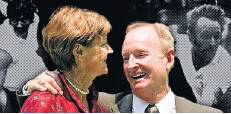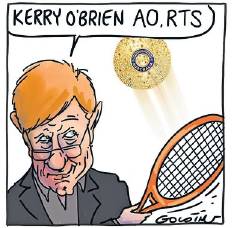Court gong aimed at ‘gender gap’
Chip Le Grand
Chief reporter
Margaret Court was given Australia’s highest civilian honour to address a gender disparity created five years ago when Rod Laver became the first tennis player to be made a Companion of the Order of Australia (AC).
Members of the Council for the Order of Australia, speaking on the condition of anonymity, said the decisive argument behind the move to elevate Court to an AC was that our greatest women’s player deserved the same level of recognition as our greatest men’s player. The council anticipated a fierce public backlash, but after lengthy debate it decided Court’s attitude towards homosexuality, although offensive to many people, should not prevent recognition of her extraordinary tennis achievements. Court said this was consistent with what she was told when she first learnt she had been made a Companion of the Order of Australia. ‘‘I said, ‘What is it actually for?’’’ she told The Age.
‘‘They said, ‘It is for your tennis.’ I have tried to say that and nobody has listened.’’
Court’s AC citation makes clear the award is for her tennis. It carries no mention of her work as a Pentecostal pastor, which has included sermonising against homosexuality, marriage equality and the transgender community.
It reads: ‘‘For eminent service to tennis as an internationally acclaimed player and record-holding grand slam champion, and as a mentor of young sportspersons.’’
The citation is more narrow than that which accompanied the 2007 AO presented to Court for her services to tennis and her pastoral work in Australia and Sri Lanka.
‘‘Rocket’’ Rod Laver’s 2016 AC citation reads: ‘‘For eminent service to tennis as a player, representative and mentor, at the national and international level, and as a role model for young sportsmen and women.’’
Laver, the only player to twice win all four major tournaments in the same calendar year, was made an MBE under Britain’s honours system in 1970.
The decision to make Court an AC has been attacked on the grounds that it promotes her divisive and hurtful views about gay and transgender people.
Opposition Leader Anthony Albanese tweeted on Monday that ‘‘making her a Companion of the Order of Australia had nothing to do with tennis’’. Retired broadcaster Kerry O’Brien, who handed back his AO in response to Court’s award, told NITV that many people would see the AC as an endorsement of Court’s views.
Tennis historian Richard Naughton – the author of books on Sir Norman Brookes, Ken Rosewall, and, most recently, Australia’s first women’s international star Daphne Akhurst – said if Court’s contentious opinions could be put aside, there was no question she belonged in the company of Laver.
‘‘On a purely tennis basis, you would have to say that Court having won a grand slam and 24 majors, all other bets aside, how can she not?’’ Professor Naughton said.
The International Tennis Hall of Fame in its biography of Court describes her as the most dominant player, male or female, the sport has seen.
Australia’s honours system continues to be male-dominated, with six out of 10 of this year’s awards going to men.
The gender bias, publicly accepted as a problem by Governor-General David Hurley, has led to a campaign across federal and state governments to increase nominations of women.
The identity of Court’s nominators is confidential.
In assessing all AC nominations, the Council for the Order of Australia considers between four and six referees provided by nominators and other referees sourced by the council.
Court is one of only nine sportspeople to be made an AC since the Order of Australia was established by the Whitlam government.
The others are Sir Donald Bradman, Olympians Betty Cuthbert, Herb Elliott, Dawn Fraser, Marjorie Jackson-Nelson and John Landy, and tennis players Laver and Evonne Goolagong-Cawley, who was made an AC in 2018.
Court said she highly respected Laver and his achievements. ‘‘I’m just honoured they thought of me that way,’’ she said.
Tennis Australia has made no public comment about Court’s award. Last summer, the sport’s national governing body wrestled with how best to mark the 50-year anniversary of Court’s calendaryear grand slam while distancing itself from her contentious social views.
Court said she had not been invited to this year’s Australian Open and – with COVID-19 travel restrictions still in place in her native Western Australia – had given no thought to attending. ‘‘I have been used as a very high-profile person to get a point across,’’ she said. ‘‘I think it is time to move on.’’

